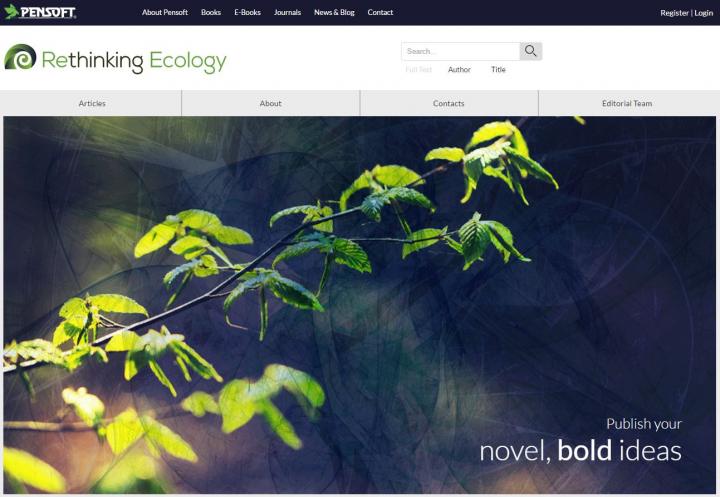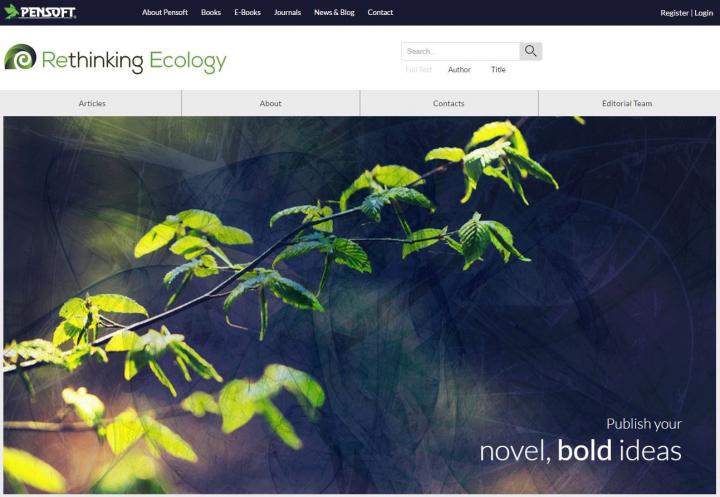
Credit: Rethinking Ecology and Pensoft
Needless to say, it is through sharing new ideas and hypotheses that critical issues such as climate change and biodiversity loss can be addressed. However, few scientists are currently in a position to do so, because publishing bold ideas in peer-reviewed journals is very difficult, especially for those who are not world-renowned scientists in their field. At the same time, scientists sharing novel ideas that have not been published yet, carry the risk of being 'scooped'. This is probably a scientist's worst nightmare: seeing someone else publish the idea they have been working on. In this context, many innovative ideas are kept secret and it can take years before they are made available to the scientific community.
This is the niche that the novel open access peer-reviewed journal Rethinking Ecology aims to fill by providing a platform for forward thinking and publication of novel ideas in all aspects of ecology, evolution and environmental science.
Adding to its innovative nature, Rethinking Ecology joins the modern technologically advanced Pensoft journals published on next-generation platform ARPHA (abbreviation standing for Authoring, Reviewing, Publishing, Hosting and Archiving). Not only is the platform to provide fast-track and convenient publishing for the authors, reviewers and editors in Rethinking Ecology, as it takes care of a manuscript through all stages from authoring and reviewing to dissemination and archiving, but it is user-friendly to the readers as well, who enjoy publications in three formats (PDF, XML, HTML) and full of semantic enhancements.
The innovative journal aims to encourage all scientists, regardless of their seniority, publication track record, gender, or country of origin, to publish perspective papers, so that they are put in the open for peers to discuss and build on, while credit is given where credit is due. Publishing these ideas early also draws attention from the scientific community, potential collaborators and potential funders. To further avoid potential bias, Rethinking Ecology implements double-blind peer review, with the journal supporting the notion that it is the content of a manuscript that matters. Moreover, reviewers will not be asked for a formal recommendation. Instead, they will comment and evaluate the work against a set of specific questions. Thus, each paper ends up with a score on Novelty, Feasibility, Scholarship and Literacy, so that only perspective papers with an emphasis on novel hypotheses and bold ideas are accepted for publication.
Another innovative feature applied in the new journal is an Author Contribution Index (ACI), meaning that each publication will include a pie chart pointing to the contribution of each of the authors, estimated in percentage. This is the editors' answer to the so-called 'guest authorship' (i.e. inclusion of authors who did not significantly contribute to the work).
It is no coincidence that Rethinking Ecology has a spiral-shaped unfurling fern leaf as a logo. Called Koru in the language of the indigenous Polynesian people of New Zealand – Māori, it symbolises novelty, new life and new beginning, as well as perpetual movement.
"Each publication in Rethinking Ecology can be seen as the beginning of life for a new idea and its metaphorical unfurling as it reaches out to the scientific community," explain the journal editors in their very first Editorial at Rethinking Ecology.
"We see Rethinking Ecology as an incubator for novel ideas, and a catalyst for new thinking," says the journal's Editor-in-Chief Dr Stephane Boyer, Unitec Institute of Technology, New Zealand.
"In a world where scientific publications are increasingly open source and immediately available, it makes no sense to keep our most innovative ideas hidden from the world for years while we secretly test them," he elaborates. "Bold ideas and new hypotheses need to be shared, they may or may not turn into world-changing paradigm shifts, but they all have the potential to contribute to new thinking."
"I am pleased to welcome a groundbreaking journal such as Rethinking Ecology to the Pensoft family, which has already built a nice and extensive portfolio of innovations in scholarly publishing," says Pensoft's founder and CEO Prof. Lyubomir Penev. "Seeing genuine ideas and hypotheses yet to be tested, and possibly, yet to revolutionise the ecological science is certainly a thing worthy of eager anticipation."
###
About ARPHA:
ARPHA is the first end-to-end journal publishing solution that supports the full life cycle of a manuscript, from authoring through submission, peer review, publication and dissemination. With ARPHA, journals and publishers enjoy a complete set of services, which enable tailored, technologically advanced publishing solutions. The platform enables a variety of publishing models through a number of options for branding, production and revenue models to choose from.
Contacts:
Dr Stephane Boyer, Unitec Institute of Technology, New Zealand
Email: [email protected]
Prof Lyubomir Penev, Pensoft
Email: [email protected]
Media Contact
Dr. Stephane Boyer
[email protected]
@Pensoft
http://www.pensoft.net
############
Story Source: Materials provided by Scienmag





